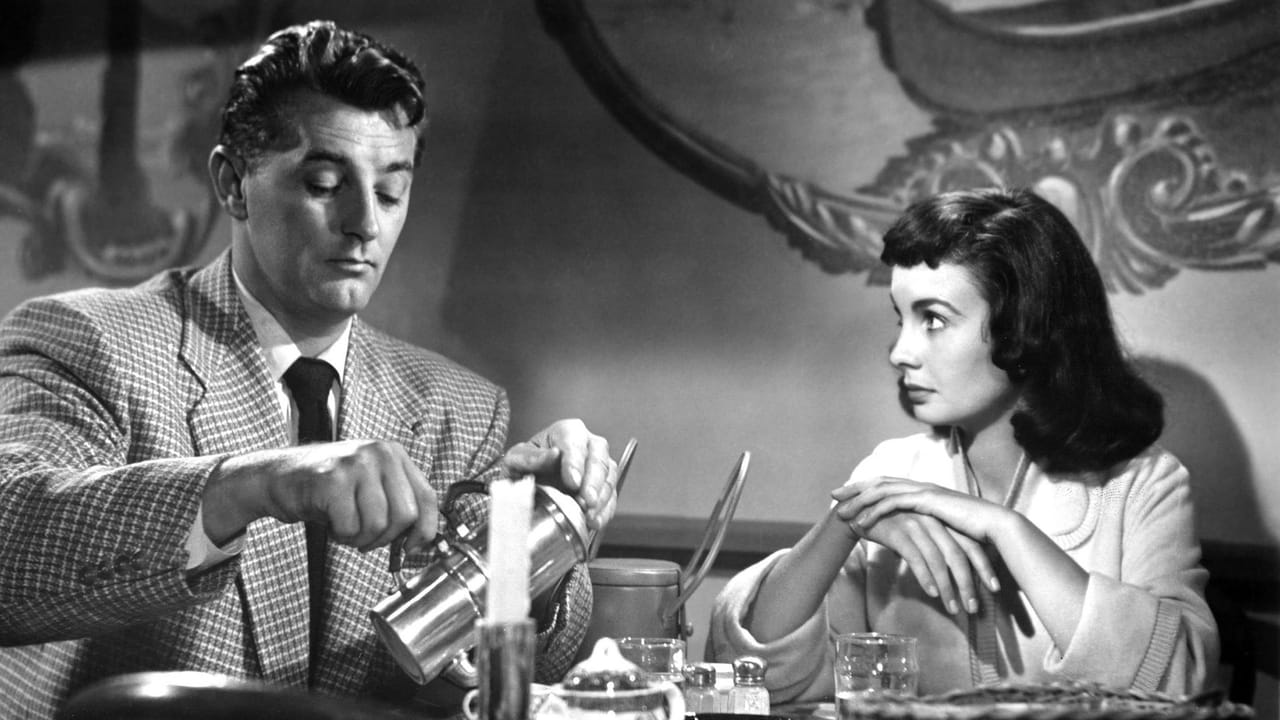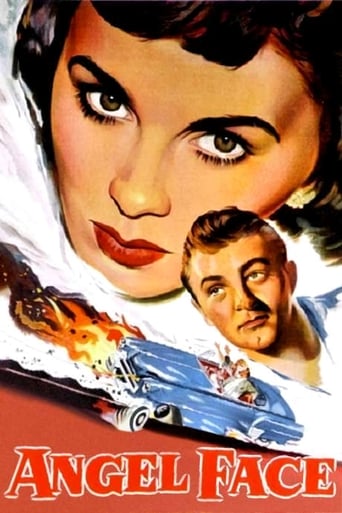

I liked Anger Face. But for once, I'd rather have seen someone other than Robert Mitchum as the male lead. He tends to dominate his scenes to such an extent that the other characters, except for Jean Simmon's Diane, end up as a backdrop of wallflowers.Frank's role calls out for a more nuanced, less self-assured presence, maybe a Dana Andrews or Richard Widmark. Mitchum definitely brings his wry humor and maverick attitude to the role; but that has the effect of mitigating the noir suspense and atmosphere with an almost comic slant. I agree with the reviewer who feels that Barbara O'Neil's and Herbert Marshall's characters are two-dimensional and uninteresting. It's Mitchum's love interests who animate the plot.As it is, Frank's spin between Mary and Diane makes little sense. Mary has the obvious good nature and girl-next-door prettiness that would seems such a better match for the everyman Frank than Diane, who has only wealth. Okay, she's certainly attractive too, but seems incredibly immature compared to Mary, and looks young enough to be Frank's daughter. Plus there's the little matter of needing her parents dead in order for her to realize her wealth.Why would Mitchum be eager to take up with Simmons when she obviously hates the stepmother for no good reason, and he suspects, based on the opening sequence, that she has tried already to kill her? He has plenty of opportunities to go back to Mary, but ultimately burns his bridges. Mary's right that he can't expect her to drop everything, including her new boyfriend/fiancee, just because he becomes available. Frank's last scene with Mary seems stiff and formal from his perspective; he's forvever lost the casual familiarity she now shares with Frank's former friend and coworker.There's two possibilities for Frank: either he's 'fallen between two stools' by losing both women, or he really doesn't care that much for relationships anyway. That explains his last-minute decision to split to Mexico. And that puts Diane in the driver's seat, literally, just long enough for her to kill both of them.That leads us to Simmon's character. If we accept that she's a budding sociopath, then the murder/suicide makes some sense. If she can't have Mitchum, then no one will. Still, since sociopaths are inherently selfish, wouldn't she want to live? Also, If she's just having a sudden nuts/jealous impulse, why not kill just him? At least there was a point to setting up her stepmom's murder. She gets closer to the family money.On the technical side, Angel Face hits on all cylinders: both of the car crashes follow-through with the actual car (first the Chrysler, then the Jaguar) tumbling down the hill, not the usual substitute-a-jalopy-for-the-expensive-car deal. Even better, in the courtroom scene when the engine from the wrecked Chrysler is used as evidence, we get an authentic and properly banged-up early Chrysler hemi.Anyway, a watchable but not-so-noir film noir. There's an interesting plot, which, as others have pointed out, shows up in better company in other noir thrillers. I was disappointed enough with the way the cast interacted, or rather failed to interact convincingly, to rate Angel Face higher. Good title, though.
... View MoreApparently shot in 18 days to ensure Jean Simmons filmed her part while still under contract to producer Howard Hughes, this is a fine film noir with a particularly memorable ending.I wasn't sure I could believe Robert Mitchum, the king of world-weary sardonic-ism, falling so readily for the youthful charms of evil step-daughter Simmons, especially with a smart, pretty and loving girl of his own, but once I surrendered this point, it was easy, rather like Mitchum's ambulance-driver, to be persuaded to follow the plot here through to the bitter end.I actually considered both leads to be somewhat miscast in the film, Simmons effect dulled somewhat by a rather ugly helmet of a wig and the dialogue lacks the snap of a Hammett, Chandler or even a Spillane, but the narrative is intriguing and the ambivalent natures of both the main parts strangely compelling, plus, like I said there's a surprise, no make that shock ending, to finish things off with a knockout punch.Director Preminger mixes up some staple noir elements of a femme fatale, her stooge of a male admirer, sex, murder and mystery, employing big-close-ups, atmospheric lighting and crisply shot monochromatic sets, perhaps only faltering over a slightly dull, over-technical courtroom scene, and the miscasting already mentioned. Nevertheless, the story crackles along and I doubt many will anticipate the climax, which certainly caught me off-guard and yet in retrospect, delivers a finish true to the genre's often nihilistic traits.Mitchum of course is naturally very good as the ensnared Frank, the piano-playing Simmons, dressed throughout in black and white outfits, perhaps stressing the duality of her nature, a little less so.
... View MoreWith Otto Preminger directing and Robert Mitchum as your star how can you go wrong? OK this film does take a while to get into gear, but when it does there is no shifting back into reverse. Unique great films like this one are the reason I'm doing this project to watch every single classic film noir I can get my hands on. There is no way a major Hollywood studio would ever tell a story like this today. The big Hollywood studio that produced this film was the faltering Howard Hughes-helmed RKO. The box office takings from this 1952 film certainly didn't help and the studio fell over the cliff a few years later. The 'Angel Face' of the title, Jean Simmons was under contract with RKO but wanted to bat her eyelashes for a different studio. She tried to sabotage her unwanted contract by cutting her hair short. but Hughes wasn't defeated that easily, he just forced her to wear a wig for this film.
... View MoreThis is a rather tepid and disappointing film noir produced and directed by Otto Preminger. I believe the reason why it does not amount to much is that it was a Howard Hughes production. Presumably, he was obsessed by Jean Simmons at the time and just wanted to rush her into a 'vehicle' as part of his standard seduction process. More care was taken to get her breasts pointy than was taken over getting a decent script into shape: it needed several rewrites, but the breasts needed no more sharpening, that's for sure. As we all know, Hughes had a mammary fixation of megalomaniac proportions. At an earlier date, he had been so obsessed by Jane Russell's breasts that he personally designed a special cantilevered bra to make them protrude and point more. Here, Simmons was ordered to wear a sweater too small for her, which stretched over her breasts as tightly as cellophane covers meat in a supermarket, and beneath this she had been fitted with what can only be called a double pointer-mechanism of some kind. The result is two knife-like emanations from her chest. One suspects that if she had turned round too fast, she might have sliced Robert Mitchum in half. However, he is his usual rough and ready self, not taking her too seriously, ready to walk out on her at any time, and, well, being Mitchum. I thought I detected signs of boredom in Mitchum, as if he thought this film were a real drag. Getting pernickety notes from Howard Hughes every day must have driven a free spirit like Mitchum crazy, and he probably wanted to walk out on the production, not just on Simmons's crazy character. If anyone had taken the trouble to make the script work, this could possibly have been an effective noir. Ben Hecht was brought in to do something to pep it up, and he must have added some of the good lines such as Mitchum's hard-boiled line 'I've been slapped by plenty of gals before.' But spice in a bad dish does not necessarily save it. Too many reviewers are all excited just because Mitchum and Simmons are on screen, but that's not the issue. (I almost said that's not the points, but must get that image of Simmons's chest out of my mind, it's too disturbing.) Simmons is meant to play a girl of 19 (a part for which she was too old, as she was 23 and looked 25) who is mentally deranged. She does her best to do her 'spooky look', with the haunted eyes and the mad stare, the lingering over things ominously, and other tricks of the kind. But it is not enough. If she had been Meryl Streep this would have worked; after all, in THE FRENCH LIEUTENANT'S WOMAN all Streep had to do was look at the camera in a certain way and we all knew what she was like from the very first scene. But Simmons was just a movie star, not a genius. So she needed more convincing scenes to get the idea across, and they had not been written for her. Preminger was not in top form, but he did one totally brilliant sequence towards the end of the film, where Simmons walks from room to room of the empty house, taking in the emptiness of each room one by one, in a kind of crescendo of despairing loneliness as she realizes that she is more alone than she ever imagined was possible. Each room makes her feel more alone than the last. This is all done without words, and Preminger takes a long time over it, not hesitating to eat up celluloid in order to get his effect, and it works spectacularly well. But this was something Preminger was able to do as a director without using the incompetent script, he just added it in on his own initiative. It was a master's touch, but not enough to save the film. At least Hughes did not make him cut the sequence, and it was left in the final cut. This film was such a lost opportunity, even though it contained so many clichés such as the demented girl playing sad music on a grand piano, the depressing mansion, the pompous rich stepmother (Barbara O'Neil), and the kept husband, stiffly played by Herbert Marshall, who has little to do so that his talents are wasted. One good job of acting is Mona Freeman as Mitchum's girl friend Mary. She plays such a typical fifties young woman, and there were so many, many thousands just like her at that time. She had been signed originally by Hughes, who must have cast her. She is apparently still alive aged 86, and good for her, though she last acted in 1972, so she must have gone straight. This film depends upon us being convinced that Simmons is not merely a 'crazy mixed-up kid' but a genuine psychotic killer. And that just doesn't come across, sorry.
... View More